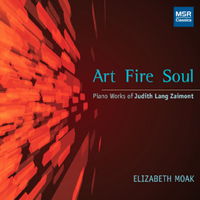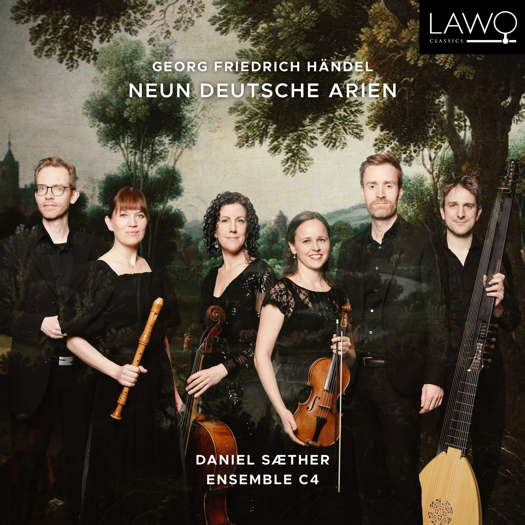 SPONSORED: CD Spotlight. An Encyclopedic Recital - Elizabeth Moak plays Judith Lang Zaimont, heard by the late Howard Smith.
SPONSORED: CD Spotlight. An Encyclopedic Recital - Elizabeth Moak plays Judith Lang Zaimont, heard by the late Howard Smith.
All sponsored features >>
 25 YEARS: Classical Music Daily celebrates twenty-five years of daily publication with an hour-long video featuring some of our regular contributors.
25 YEARS: Classical Music Daily celebrates twenty-five years of daily publication with an hour-long video featuring some of our regular contributors.
- Catalan
- early music
- Astrakhan
- Ludvig Norman: Overture to Shakespeare's Antony and Cleopatra
- Laurence Davies
- Jonathan Dove: The Passing of the Year
- Central Song and Dance Troupe
- Herder Prize

A Lovely, Lovely Issue
GERALD FENECH recommends music by Handel and Vivaldi from Daniel Sæther and Ensemble C4
'... up there with the very best ...'
Born in Halle, Germany, on 23 February 1685, George Frideric Handel is regarded as one of the greatest baroque composers of his day, and his music is as popular today as it was in his time. Famous for his operas, oratorios, anthems and organ concertos, as a child he studied music with the organist Friedrich Wilhelm Zachow, and for a time he seemed destined for a career as a church organist himself. In 1703 he took a post as violinist in the Hamburg opera orchestra and in 1706 he was installed as court composer in Hannover. In 1711 English audiences took to his opera Rinaldo, and several years later the composer moved permanently to England. Early on he impressed King George with the Water Music of 1716, written as entertainment for a royal boat outing.
Through the 1720s Handel composed a number of Italian operatic masterpieces for London stages, but in the 1730s and 1740s English audiences grew tired of this genre so Handel turned to oratorio, which displayed to maximum effect Handel's melodic gift and the sense of timing he brought to big choral numbers.
In 1737 Handel suffered a stroke which caused both temporary paralysis in his right arm and some loss of his mental faculties. Blind in old age, he strove doggedly ahead with his compositions but in the end he lost his final battle. Handel died in London on 14 April 1759, and this is what Beethoven remarked many years later:
I would bare my head and kneel at his grave.
Greatness recognizing greatness.
What about the composer's German arias? Indeed, Handel wrote little for his native tongue, but what he did demonstrates a particular level of contemplative pietism while still employing the familiar technique of Italian opera.
Listen — Handel: Süße Stille, sanfte Quelle (Neun Deutsche Arien)
(LWC1269 track 4, 0:00-0:47) ℗ 2024 LAWO :
In these nine German arias he set poems of his contemporary Barthold Heinrich Brockes, and their theme is that the abundant goodness of God is evident in the joy and beauty of his creation. These works still rank among his best-kept secrets. Nonetheless, Brockes' verses are a pantheistic celebration of God-in-Nature, and Handel responded with music of hedonistic enchantment, from the rapt, wondering 'Süße Stille' to the joyous ebullience of 'Das zitternde Glänzen'.
Listen — Handel: Das zitternde Glänzen der spielenden Wellen
(Neun Deutsche Arien)
(LWC1269 track 2, 0:31-1:07) ℗ 2024 LAWO :
Indeed, the musical relationships with Handel's opera arias are evident in the endless ingenuity of his characterization and the expressive articulate melodies with which the soloist and the violin obbligato create their vivid images.
This album also includes a bonus in the form of Vivaldi's Sonata in D minor, RV 63, delightfully transposed and adapted for treble recorder and violin by Martin Straeten.
Listen — Vivaldi, adapted by Martin Straeten: Allegro (Trio Sonata in G minor)
(LWC1269 track 12, 1:01-1:44) ℗ 2024 LAWO :
These arias have been well served on disc with many fine recordings to choose from, and this album is certainly up there with the very best, not only for the attractive gracefulness of Daniel Sæther's singing but also for the absolutely expressive playing of Ensemble C4.
Indeed, both singer and instrumentalists offer a most assertive version of these exquisite works from one of musical history's truly great composers whose music sounds as fresh today as it was in his time.
Listen — Handel: Süßer Blumen Ambraflocken (Neun Deutsche Arien)
(LWC1269 track 3, 2:45-3:44) ℗ 2024 LAWO :
This is a lovely, lovely issue that compels me to recommend it to all kinds of music lovers, both young and old. Sound and booklet notes are as complimentary to the programme as one could wish for.
Copyright © 21 March 2024
Gerald Fenech,
Gzira, Malta



